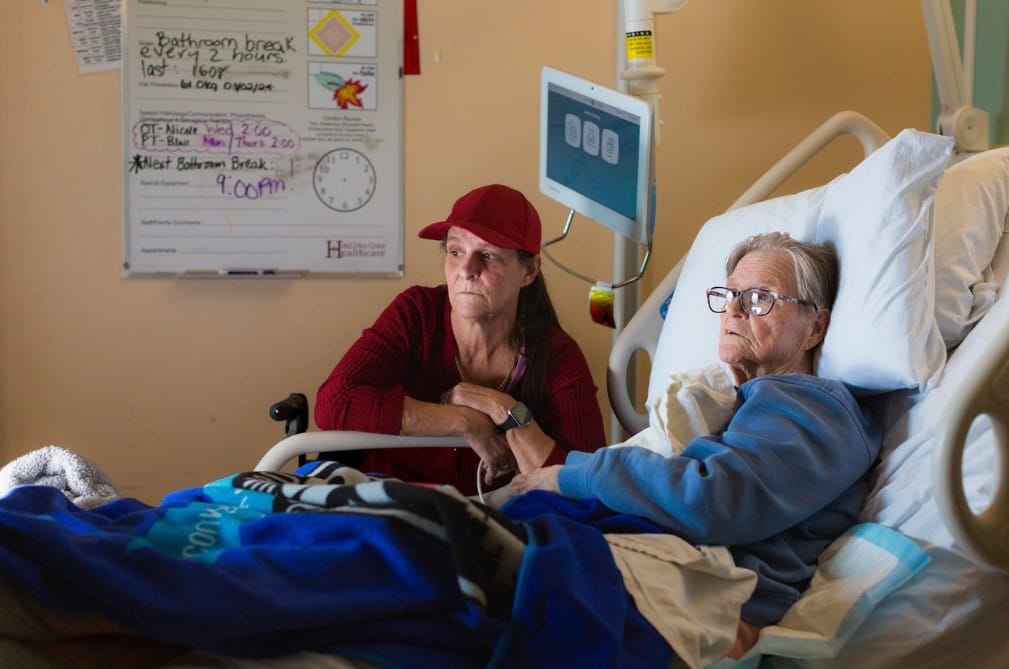Contentious bill intended to free up hospital beds for testing in an Ontario court
Since the law is not achieving its intended effect, they argue, it is arbitrary and should be overturned.

A new legal challenge beginning Monday will assess the constitutionality of a contentious Ontario law that allows hospitals to transfer discharged patients to long-term care homes not of their choosing, or face a daily charge of $400 if they refuse.
The Advocacy Centre for the Elderly and the Ontario Health Coalition argue that the law, known as the More Beds, Better Care Act (Bill 7), violates the Charter of Rights and Freedoms.
The Ontario government, however, disagrees.
One key issue the court will consider is whether the law has achieved its goal of improving patient flow in hospitals. Court documents show that both sides have reached differing conclusions on this point.
Premier Doug Ford's government passed Bill 7 rapidly in September 2022, skipping public hearings.
The law allows hospital placement coordinators to assign a nursing home to patients deemed in need of "alternate level of care" (ALC) by a doctor, without requiring patient consent.
It also permits the sharing of patient health information with nursing homes, again without consent. Patients could be placed up to 70 kilometers from their preferred location in southern Ontario, and up to 150 kilometers away in northern Ontario, sparking anger among seniors.
In court filings, the organizations opposing Bill 7 argue that the law has failed to reduce the number of ALC patients. According to data from Ontario Health, the number of these patients has increased by 30% over a year since the law's implementation.
By the end of January, around 2,300 discharged patients were still waiting in hospitals for placement in nursing homes.
“The evidence contradicts any claim that Bill 7 has effectively expedited the transition of ALC-LTC patients from hospitals,” the opposing groups assert.
They argue that the primary reason for delays is not patient reluctance, but the shortage of long-term care beds, with long waitlists for facilities offering suitable care.
Since the law is not achieving its intended effect, they argue, it is arbitrary and should be overturned.
The Ontario government counters that the rising number of ALC patients is not proof of Bill 7's failure, but rather a result of population growth. The province also cites support from hospital administrators who say the law has helped improve patient flow.
Trillium Health Partners, which operates two large hospitals in Mississauga, reported that the law enabled the transfer of 240 ALC patients to nursing homes in a three-month period.
Without Bill 7, patient flow would suffer, as more acute care beds would be occupied by patients who no longer need them, said Scott Jarrett, Chief Operating Officer of Trillium, in an affidavit. Other hospital officials have made similar statements.
The Advocacy Centre and the Ontario Health Coalition also argue that the law disproportionately affects seniors in poor mental and physical health, stripping them of the right to choose where to live and how their health information is handled.
Over 80% of ALC patients are 65 or older, and most suffer from incurable, age-related conditions. The organizations claim Bill 7 infringes on the Charter's protections for life, liberty, and security.
“Bill 7 violates the liberty rights of ALC-LTC patients by denying them autonomy over their medical treatment and healthcare,” they argue, adding that it denies patients the right to give informed consent about where they will likely spend their final days and how their personal health information is shared.
Both sides agree that there is a shortage of hospital and long-term care beds in Ontario.
While the province is building more hospitals and encouraging the construction of new nursing homes, the current supply does not meet demand, according to court documents.
Ontario lawyers argue that the purpose of a hospital bed is not to serve as a waiting area for long-term care admissions.
They also assert that patients do not have a Charter right to remain in hospital without cost after being discharged, and that Bill 7 does not discriminate based on age or disability.
“Bill 7 does not infringe on anyone’s Charter rights,” provincial lawyers wrote.
As of January 31, 2024, there were 2,243 ALC patients waiting for nursing home spots, who had collectively spent nearly 200,000 days in hospital beds, according to the province.
The Charter does not protect against the sharing of private health information, they argue, noting that several laws regulate how such information can be shared, including under court orders.
The government also stresses that patients are not forced into specific nursing homes, as they can refuse the placement.
However, those who choose to stay in the hospital after discharge will face the financial consequence of paying part of the cost for occupying a publicly funded hospital bed.
The organizations opposing Bill 7 contend that the $400-per-day charge is coercive, while the province describes it as a deterrent designed to encourage patients to accept placements.
Only five people have been charged under the law, according to the health minister’s office.
For some, the threat of a fine wasn’t enough to force compliance.
Michele Campeau, who holds power of attorney for her 83-year-old mother Ruth Poupard, refused a hospital’s attempt to move her mother to a Windsor nursing home she found unsuitable.
After touring the facility, which she described as filthy and understaffed, Campeau declined the placement. Hôtel-Dieu Grace Healthcare then charged the family $400 per day, resulting in a $26,000 bill.
Campeau refused to pay, and her mother was eventually placed in her top-choice nursing home.
By mid-September, Campeau reported that no one had attempted to collect the money.
“I would encourage others to fight back because, in the end, the fight is worth more than placing your loved one in an unacceptable situation,” Campeau said.





